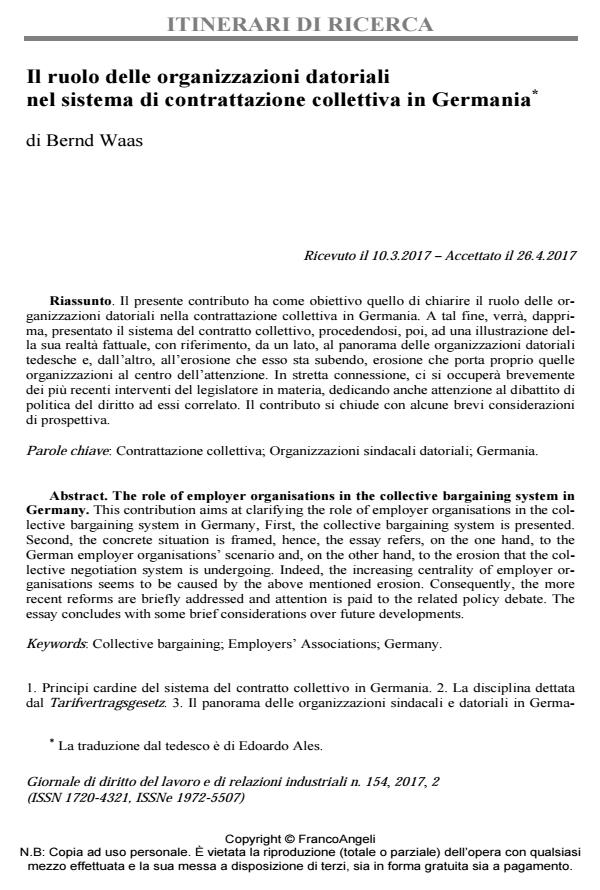The role of employer organisations in the collective bargaining system in Germany.
Journal title GIORNALE DI DIRITTO DEL LAVORO E DI RELAZIONI INDUSTRIALI
Author/s Bernd Waas
Publishing Year 2017 Issue 2017/154 Language Italian
Pages 14 P. 239-252 File size 181 KB
DOI 10.3280/GDL2017-154002
DOI is like a bar code for intellectual property: to have more infomation
click here
Below, you can see the article first page
If you want to buy this article in PDF format, you can do it, following the instructions to buy download credits

FrancoAngeli is member of Publishers International Linking Association, Inc (PILA), a not-for-profit association which run the CrossRef service enabling links to and from online scholarly content.
This contribution aims at clarifying the role of employer organisations in the collective bargaining system in Germany, First, the collective bargaining system is presented. Second, the concrete situation is framed, hence, the essay refers, on the one hand, to the German employer organisations’ scenario and, on the other hand, to the erosion that the collective negotiation system is undergoing. Indeed, the increasing centrality of employer organisations seems to be caused by the above mentioned erosion. Consequently, the more recent reforms are briefly addressed and attention is paid to the related policy debate. The essay concludes with some brief considerations over future developments.
Keywords: Collective bargaining; Employers’ Associations; Germany.
- Anders C., Biebeler H., Lesch H. (2015). Mitgliederentwicklung und politische Einflussnahme: Die deutschen Gewerkschaften im Aufbruch?. IW-Trends, 2015, n. 1.
- Behrens M., Helfen M. (2016). Sachzwang oder Programm? Tarifpolitische Orientierungen und OT-Mitgliedschaft bei deutschen Arbeitgeberverbänden. WSI-Mitteilungen: 452 ss.
- Bepler K. (2014). Stärkung der Tarifautonomie – Welche Maßnahmen empfehlen sich?. NZA: 891 ss.
- Deinert O. (2014). Negative Koalitionsfreiheit, Überlegungen am Beispiel der Differenzierungsklausel. RdA: 129 ss.
- Deinert O., Walser M. (2015a). Tarifvertragliche Bindung der Arbeitgeber – Bindungswille und -fähigkeit der Arbeitgeber und ihrer Verbände als juristisches und rechtspolitisches Problem. Baden-Baden: Nomos.
- Deinert O., Walser M. (2015b). Zur Förderung der Mitgliedschaft von Arbeitgebern in Verbänden. AuR: 398 ss.
- Ellguth P., Kohaut S. (2014). Öffnungsklauseln – Instrument zur Krisenbewältigung oder Steigerung der Wettbewerbsfähigkeit?. WSI-Mitteilungen: 439 ss.
- Ellguth P., Kohaut S. (2016). Tarifbindung und betriebliche Interessenvertretung: Ergebnisse aus dem IAB-Betriebspanel 2015. WSI-Mitteilungen: 286 ss.
- Franzen M. (2017). TVG § 3. In: Müller-Glöge R. et al., eds., Erfurter Kommentar zum Arbeitsrecht. XVII ed. München: Beck Verlag.
- Giesen R. (2016). Reform der Leiharbeit. ZRP: 130 ss.
- Höpfner C. (2015). Das Tarifvertragsrecht auf dem 70. Deutschen Juristentag 2014 – Eine Nachbetrachtung. RdA: 94 ss.
- Linsenmaier W. (2017). Art. 9 GG. In: Müller-Glöge R. et al. (eds.), Erfurter Kommentar zum Arbeitsrecht. XVII ed. München: Beck Verlag.
- Löwisch M., Rieble V., a cura di (2017). Tarifvertragsgesetz. IV ed. München: Beck Verlag.
- Schmidt I. (2017). Art. 3 GG. In: Müller-Glöge R. et al. (eds.), Erfurter Kommentar zum Arbeitsrecht. XVII ed. München: Beck Verlag.
- Waltermann R. (2014). Stärkung der Tarifautonomie – Welche Wege könnte man gehen?. NZA: 874 ss.
- Constitutional Framework of European Labour Law in Italy, France, Germany, Portugal and Spain Luís Gonçalves da Silva, Sara Leitão, pp.47 (ISBN:978-3-031-45716-6)
- I perimetri contrattuali e la rappresentatività datoriale Donata Gottardi, in GIORNALE DI DIRITTO DEL LAVORO E DI RELAZIONI INDUSTRIALI 172/2022 pp.627
DOI: 10.3280/GDL2021-172009
Bernd Waas, Il ruolo delle organizzazioni datoriali nel sistema di contrattazione collettiva in Germania in "GIORNALE DI DIRITTO DEL LAVORO E DI RELAZIONI INDUSTRIALI " 154/2017, pp 239-252, DOI: 10.3280/GDL2017-154002